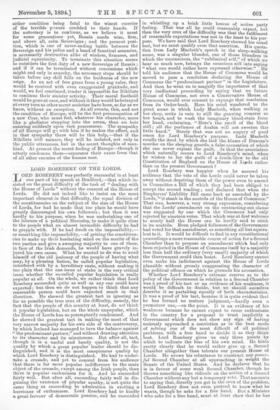TOPICS OF THE DAY.
THE DEATH OF THE CZAR. THE melancholy scene at Livadia, so instructive in the contrast it presented between earthly grandeur and earthly equality in the presence of disease, has ended as from the first all experts have recognised that it must end. Bright's disease, though often arrested for years, is mortal after a certain stage has been reached ; and there has not been, from the beginning, any hope among men of science for the Czar. His splendid physique resisted long ; but blood-poisoning set in, and on Thursday Alexander III. of Russia passed away. His has been a strange fate among monarchs. Not an able man, even in his own opinion., and not a philanthropic one ; in essence, indeed, more like a hard-tempered Squire than any King in history, it has been his lot, though he himself was one of the un- happiest of mankind, to protect the happiness of Europe for thirteen years ; and to hear, as he lay dying in the Crimea, that splendid service acknowledged by a universal chorus of sympathy and approval. The dominant section of the human race is sighing audibly for his fate. We cannot recall a more wonderful instance of revulsion in popular feeling. During the whole of his reign in health, Alexander III. had been a kind of bogey to the Liberal masses, and had been cursed in all languages as the repre- sentative man of despotism, the persecutor of Jews, Catholics, and Russian Nonconformists, the gloomy prisoner of Gatschina who threatened by his mere exist- ence the civilisation of the world. Even the catastrophe of Borki, when the Czar, saved by what his subjects deemed a miracle, stepped from his carriage amidst the dead and dying, all innocent but all slain in order to reach his life, scarcely changed the sullen current of public feeling, which nevertheless, when once a mortal illness had struck him, grew suddenly clear and bright. The Czar being once reduced to human proportions by a calamity common to mankind, all Europe recognised the truth, acknowledged in him the strong peacemaker of the age, and perceived as by a flash that even in the worst incidents of his career he had been acting up to his light, and striving, as he thought, to carry to its destination the heavy burden with which, as he believed, the Almighty had been pleased to weigh him down. Oppressed with a task too onerous for his powers, moving always amidst assassins, himself by temperament a depressed man, who thirsted for the joys of the common life, which, except for moments at Copenhagen, he could never taste, indolent by habit of body, and possibly only brave when he could see a duty, he toiled on year after year in his fortress palace, working day by day like any barrister in practice, resisting all influences, confronting all dangers, fixedly determined on two ends, —to make Russia Slav and not German, and to keep the peace of the world. How far he succeeded in the former object none but Russians can say, and even they will give no certain answer ; but his success in attaining the second is attested by the voices of twenty nations, who, though only one of them is friendly to his country, cry loudly, as they hear of his departure, that a protector has disappeared. The acknowledgment is as universal as it is sincere ; it comes from those who know as well as from the millions ; and it is a wonderful tribute to be offered at the grave of a man whose station, as well as his apparent nature, made him the embodiment of all from which modern Europe is revolting. A piti- less autocrat, a rigid pietist, a narrow foe of Western progress, a man who had done no great act, thought no great thought, advanced no great cause, Alexander III. still passes to his grave amidst the blessings of a hun- dred millions of men, not one of whom was his subject, or in any way his worshipper. So keen is the feeling, that it is a pleasure to entire nations to believe that the dying Czar knew of it at the last, and that it soothed for him the mental pangs caused by a disease of which perhaps the worst peculiarity is, that it breaks the spring even in the temperament of the gay. Despot because it was his duty, persecutor for conscience' sake, bigot from humble fear of God, modern society which sees all these drawbacks in his character, still parts. with the unhappy Czar as with a friend who had been in the greatest crisis of its life also a benefactor. If his courtiers wished to write above his tomb strong words of eulogy, yet absolutely true, they would engrave upon it, "Alexander III., pardoned in consideration of service by a plebiscite of mankind." It is useless to discuss the scene around the bedside, though the world is discussing it with headlong eagerness. The secret, if there is one, is well kept; and whether Nicholas II, ever contemplated renunciation, or whether the rumours of that improbable act arose from a palace intrigue ; why the Princess Alix was summoned to Livadia, and why, being summoned, the marriage was delayed ; why the family council was gathered from all Europe, and what was the dilemma dreaded, will probably remain unknown for at least a generation. Official Russians say every story from Livadia is a lie ; and it is not only probable, but certain, that no story coming from thence, whatever its kind, contains more than half a truth. Nor is it of much more use to discuss the character of the man whose character has suddenly become so vitally important to Europe. The future must reveal, as it will also greatly modify, that strong factor in the future problem ; and it is more useful to point out that at first the new Sovereign will not be thinking of Europe, but of himself and Russia. It is no crown of gold that he takes up, but one of dagger-points all pressing downwards towards his head. He has to decide first of all, as his father had to decide, what he will do with the Nihilists,—whether, in fact, he will defy them, or by wise concessions melt away the basis upon which rests their evil power. Fortunately for him, he is freer than his father was. A greater man than Alexander III. would probably have countersigned the decree prepared by his father, Alexander II., summoning a "Grand Mir," or representative Council, not to legislate but to deliberate and advise ; but it is not to be denied that the act, had he performed it, would have shaken every throne in Europe. It would have been read by all Anarchists and Nihilists as a. victory for their policy of terror. This consideration was strongly pressed from Berlin and Vienna, and unhappily it prevailed, the con- sequences being for the Czar thirteen years of misery and a premature death. This form of pressure will not be experienced by the new Sovereign, who has moreover the great. advantage of knowing, from the experience of his cousin at Berlin, that it is quite possible to intrust certain powers to a Parliament, and yet remain the unquestioned head of the executive. Russia is not ready for representative government, but there is no reason to doubt that an elected council deliberating in public would remedy many of the worst abu ses in the Empire, and terminate that feeling of despair among the educated, which, and not popular discontent, is the moving cause of Nihilism. Local tyrants would be afraid of the free speech which must be conceded to such a Council, and it would, moreover, be able to make suggestions about the economic situation which the officials, even if they under- stand it, will never press upon the Czar. Unhappily it is of this very free speech that the great men of Russia are afraid, not only because the universal silence protects their power, but because from long habitude they have become even more sensitive to criticism than the majority of Continental personages. Even to many Englishmen the distinction between critical comment and personal insult is hardly perceptible ; and to the great folk of the Continent, and especially the great soldiers, it is not per- ceptible at all. They rage under it as if their honour had been aspersed. Their timidity need not, however, affect the Czar, who will remain, as the German Emperor does, exempt from public criticism within his own dominions ; and the true point for him, as patriot and Romanoff, to consider is, to put it plainly, this. Is it not worse for his dynasty and his country that he and his successors, who are on the hypothesis to remain the sources of all good. for Russia, should remain under a terror like that exercised by the Nihilists, than that they should bear the annoyances which would, no doubt, follow a r6gime of comparatively free speech ? We cannot, we confess, feel a doubt as to the accurate reply. There will be annoyance, perhaps bitter annoyance, especially at first, when the silence of generations is broken, and everything done in Russia is discussed as it is in Germany ; but it is simply impossible that a family should remain for generations under the curse of such terror as the Nihilists inflict, without deterioration of some kind, both physical and mental2 Either the Czars will grow nervous or they will grow callous, either condition being fatal to the wisest exercise of the terrible pewers confided to their hands. If the autocracy is to continue, as we believe it must for some generations yet, Russia needs wise, firm, and. above all, calm Sovereigns ; and the present posi- tion, which is one of never-ending battle between the Sovereign and his police and a band of fanatical assassins, is necessarily destructive alike of wisdom, firmness, and judicial equanimity. To terminate this situation seems to outsiders the first duty of a new Sovereign of Russia ; and if it can be terminated without concessions which might end only in anarchy, the necessary steps should be taken before any chill falls on the freshness of the new reign. As an act of free grace from a young ruler, they would be received with even exaggerated gratitude, and would, we feel convinced, render it impossible for Nihilists to continue their sinister activity. Their moral foothold would be gone at once, and without it they would be betrayed at every turn as other secret societies have been, so far as we know, without an exception. At all events, this, and not the condition of Europe, will be the first preoccupation of a new Czar, who must feel, whatever his character, more like a gladiator stepping into the arena, than an heir entering suddenly upon vast possessions. The sympathy of all Europe will go with him if he makes the effort, and in that sympathy there will be this help,—that if the Nihilists still menace, they will be isolated, not only in the public utterances, but in the secret thoughts of man- kind. At present the secret feeling of Europe—though it utterly condemns them—separates their cause from that of all other enemies of the human race.



















































 Previous page
Previous page